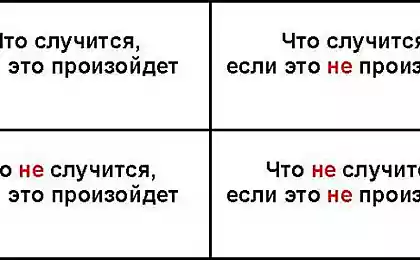190
Square Descartes: how to restore order in the head and overcome laziness

Every day, we make hundreds of decisions, from choosing breakfast to life’s fateful twists and turns. But what happens when the mind sinks into the chaos of doubt and procrastination becomes our constant companion? There is an elegant tool that can dramatically change your approach to problem solving.
The decision-making revolution
Imagine seventeenth-century Paris. Rene Descartes, the greatest philosopher and mathematician of his time, sits in his study illuminated by candlelight. In front of him lie sheets of paper with sketches of a coordinate system that would later change the world of science. But few people know that this same genius has created a tool that can revolutionize the decision-making process in our daily lives.
Descartes Square is not just a technique, it is a philosophical approach to the analysis of any situation. It is based on four fundamental questions that help to consider the problem from different angles and make an informed decision. In an era of information abundance and constant stress, this tool becomes especially relevant.
The structure of the Descartes square
What would happen if that happened? Analysis of the positive consequences of the decision
What happens if that doesn't happen? Addressing the negative consequences of inaction
What won't happen if that happens? Understanding Missed Opportunities in Action
What won’t happen if that doesn’t happen? Awareness of missed opportunities in inaction

Neurophysiology of laziness and procrastination
To understand how Descartes Square helps fight procrastination, it is necessary to understand the mechanisms of our brain. Modern research shows that laziness and procrastination have deep neurophysiological roots.
The brain’s limbic system, which is responsible for emotion and motivation, often conflicts with the prefrontal cortex, which is responsible for planning and self-control. This conflict is the basis of procrastination. The Descartes square activates the prefrontal cortex, forcing us to think structured and analytically.
Dr Tim Pychil of Carleton University in his research found that procrastination is associated with the inability of the brain to accurately predict future conditions. We tend to overestimate the complexity of tasks and underestimate our ability to perform them. Descartes Square helps overcome this cognitive distortion.
Psychological Roots of Sabotage
Sabotage is not just an unwillingness to do something, it is an active opposition to one’s own goals. Psychologists identify several main causes of sabotage:
Fear of success Paradoxical fear of achieving a goal because of its obligations
Perfectionism The pursuit of an unattainable ideal that paralyzes action.
Low self-esteem Convinced of their own inability to cope with the task
Lack of clarity Uncertainty about the goals and methods of achieving them
Practical application of the Descartes square
Let's take a concrete example. Marina, a 32-year-old marketer, has been putting off learning English for six months. She knows that it will help her career, but every time she finds excuses. Apply the Descartes square to her situation:
What happens if I start learning English? I will get a promotion, I will be able to read professional literature in the original, I will expand my social circle, I will increase my self-esteem.
What happens if I don’t start learning English? I will remain in the same position, miss career opportunities, feel inferior in a professional environment.
What won’t happen if I start learning English? I will not be able to spend evenings watching TV shows, there will be no free time for spontaneous meetings with friends, I will not be able to relax after work.
What won’t happen if I don’t start learning English? I won’t feel the stress of studying, I won’t spend money on courses, I won’t feel the pressure of having to practice regularly.
An analysis of these four aspects helped Marina realize that her fears are far less important than her potential benefits. Two weeks later, she enrolled in an English language course.

Advanced use techniques
Life hacks for maximum efficiency
1st
Visualization of consequences Imagine yourself in a year in each of the four scenarios
2.
Quantitative assessment Assign points from 1 to 10 to each sequence
3
Time frame Consider the consequences in the short and long term
4.
Emotional analysis Consider not only the logical but also the emotional consequences.
5
Group application Use the square for team decisions
Overcoming cognitive distortions
The Descartes square is particularly effective in combating typical cognitive distortions. Catastrophization – the tendency to exaggerate negative consequences – is neutralized by a systematic analysis of all aspects of the situation. Black and white thinking gives way to a nuanced approach.
Research by Kahneman and Tversky has shown that people tend to be more emotional about losses than about gains. The Descartes square helps to balance this tendency, forcing an equal analysis of both positive and negative aspects.
Integration with modern methods
The Descartes square is perfectly combined with other productivity techniques. David Allen’s Getting Things Done method becomes more effective when each task is pre-analyzed through the prism of four questions. The Pomodoro technique acquires an additional motivational component.
Especially powerful is the combination of the Descartes square with the principles of mindfulness. Mindfulness helps to answer each of the four questions honestly, without succumbing to self-deception and rationalization.
Conclusion: The Path to Clear Thinking
Descartes Square is not a magic wand that will instantly solve all problems. It is a tool that requires practice and honesty with oneself. But those who have mastered its application note cardinal changes in the quality of decisions made.
Start small – apply the square to simple daily solutions. Gradually, you’ll learn to automatically analyze situations from four angles, leading to smarter and more effective decisions.
Remember, order in your head begins with clear questions. Descartes Square gives you these questions, and the answers to them open the way to overcoming laziness, procrastination and sabotage.
Glossary
Descartes Square
A method of decision-making based on the analysis of four aspects of any situation through a system of questions about the positive and negative consequences of action and inaction.
Procrastination
A psychological state in which a person delays performing important tasks, replacing them with less meaningful or pleasant actions.
Sabotage
Conscious or unconscious opposition to one’s own goals and plans, often associated with internal conflicts and fears.
limbic system
The complex of brain structures responsible for emotions, motivation, memory and behavioral responses.
Prefrontal cortex
The area of the brain responsible for planning, decision-making, self-control, and abstract thinking.
Cognitive distortions
Systematic errors in thinking that affect decision-making and evaluation of situations.
Catastrophe
The tendency to exaggerate the negative consequences of events or situations.
mindfulness
A mindfulness practice aimed at developing the ability to be in the present moment and observe your thoughts and feelings without judgment.
How to find joy in life: finding interest and taste in life
Top 5 real traces of other civilizations on our planet























